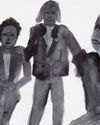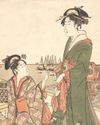As technology governs contemporary lives, the realm of art, despite long being known as a stickler for tradition, opens it arms.

Housed within the Singapore Art Science Museum is the city’s largest permanent digital art gallery “Future World”, the brainchild of Japanese tech-art collective, teamLab. Inside the sprawling exhibition space resides a digitally immersive universe of 16 diverse art installations, each strategically designed to prompt interactivity with the museum’s visitors.
Since being unveiled three years ago, the exhibition has transported more than a million visitors to the foot of a virtual waterfall where each drop of water reacts to the human touch just as it would in nature; a seemingly infinite man-made celestial universe; and a digital oasis of serenity, amongst others. Just as its name suggests, the capacious exhibition foreshadows a conceivable digitised future. Yet, at its core, what it speaks of is the present state of art.
Long understood as a mirror of the cultural zeitgeists during which it was born, art is largely reflective of greater societal shifts beyond its insular realm. For that matter, in the age of technology, contemporary art has perceivably graduated from the traditional medium of putting a paintbrush to a canvas. As technology continues to steer ahead of time, the artist’s repertoire of tools has also grown alongside it.
This intersection of art and technology is loosely parked under the umbrella term new media art — which essentially encompasses all artworks created with digital technologies from computer graphics to virtual art.
“The convergence of art and technology has certainly become more pronounced in recent years. In fact, video is almost ubiquitous to contemporary art in Singapore these days,” says Dr June Yap, Singapore Art Museum’s director of curatorial, programmes and publications.
この記事は T Singapore: The New York Times Style Magazine の April 2019 版に掲載されています。
7 日間の Magzter GOLD 無料トライアルを開始して、何千もの厳選されたプレミアム ストーリー、9,000 以上の雑誌や新聞にアクセスしてください。
すでに購読者です ? サインイン
この記事は T Singapore: The New York Times Style Magazine の April 2019 版に掲載されています。
7 日間の Magzter GOLD 無料トライアルを開始して、何千もの厳選されたプレミアム ストーリー、9,000 以上の雑誌や新聞にアクセスしてください。
すでに購読者です? サインイン

Look At Us
As public memorials face a public reckoning, there’s still too little thought paid to how women are represented — as bodies and as selves.

Two New Jewellery Collections Find Their Inspiration In The Human Anatomy
Two new jewellery collections find their inspiration in the human anatomy.

She For She
We speak to three women in Singapore who are trying to improve the lives of women — and all other gender identities — through their work.
Over The Rainbow
How the bright colours and lively prints created by illustrator Donald Robertson brought the latest Weekend Max Mara Flutterflies capsule collection to life.

What Is Love?
The artist Hank Willis Thomas discusses his partnership with the Japanese fashion label Sacai and the idea of fashion in the context of the art world.

The Luxury Hotel For New Mums
Singapore’s first luxury confinement facility, Kai Suites, aims to provide much more than plush beds and 24-hour infant care: It wants to help mothers with their mental and emotional wellbeing as well.

Who Gets To Eat?
As recent food movements have focused on buying local or organic, a deeper and different conversation is happening among America’s food activists: one that demands not just better meals for everyone but a dismantling of the structures that have failed to nourish us all along.

Reimagining The Future Of Fashion
What do women want from their clothes and accessories, and does luxury still have a place in this post-pandemic era? The iconic designer Alber Elbaz thinks he has the answers with his new label, AZ Factory.

A Holiday At Home
Once seen as the less exciting alternative to an exotic destination holiday, the staycation takes on new importance.
All Dressed Up, Nowhere To Go
Chinese supermodel He Sui talks about the unseen pressures of being an international star, being a trailblazer for East Asian models in the fashion world, and why, at the end of the day, she is content with being known as just a regular girl from Wenzhou.